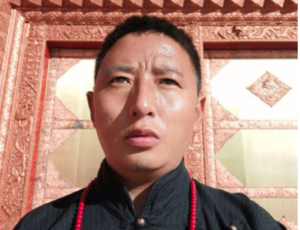 Tashi Wangchuk, the Tibetan language advocate who spent five years in a Chinese prison for “inciting separatism” as his The New York Times video drew international attention to the restrictions on Tibetan language education in Tibet, and later released after completing his prison term, has again faced interrogation from the Chinese authorities. He revealed details of the interrogation on his Weibo account, saying that following his recent appeal to the Chinese Government to allow the use of Tibetan language in schools, government jobs and other public sectors, he was summoned and questioned by the local police on January 17.
Tashi Wangchuk, the Tibetan language advocate who spent five years in a Chinese prison for “inciting separatism” as his The New York Times video drew international attention to the restrictions on Tibetan language education in Tibet, and later released after completing his prison term, has again faced interrogation from the Chinese authorities. He revealed details of the interrogation on his Weibo account, saying that following his recent appeal to the Chinese Government to allow the use of Tibetan language in schools, government jobs and other public sectors, he was summoned and questioned by the local police on January 17.
Tashi Wangchuk says that one of the questions he was asked during the interrogation was “who had given me the responsibility to advocate for use of the Tibetan language?”.
He wrote on his Weibo account on January 3 that for Tibetans applying for government jobs, no qualifying exams are allowed in the Tibetan language, leaving young Tibetans with no choice but to study Chinese in schools thereby losing the opportunity to study their own language. He added “the situation has become so bad that some of them later can’t even read or write in Tibetan”.
Tashi Wangchuk was released on January 28 last year after completing his five-year prison term and is now subjected to near-constant monitoring and surveillance from the Chinese authorities, says Radio Free Asia. With regard to his imprisonment and interrogation he says , “I think that the officials in Yulshul city and the police bureau are just using their power to stop the public from addressing these problems and advocating for the use of our own language”.
Wangdhen Kyab, a senior researcher at Tibet Watch, the UN-based research and advocacy group, speaking to Radio Free Asia said that “it had once been required that officials in government offices in Tibet learn and understand the Tibetan language, but now the situation has completely changed. The Tibetan language has become increasingly marginalised under China’s so-called Bilingual Education Policy”. He added, “Tashi Wangchuk has spoken up fearlessly about this, and we can see that he will continue to do so despite the Chinese government’s constant harassment and warnings”.




 Print
Print Email
Email